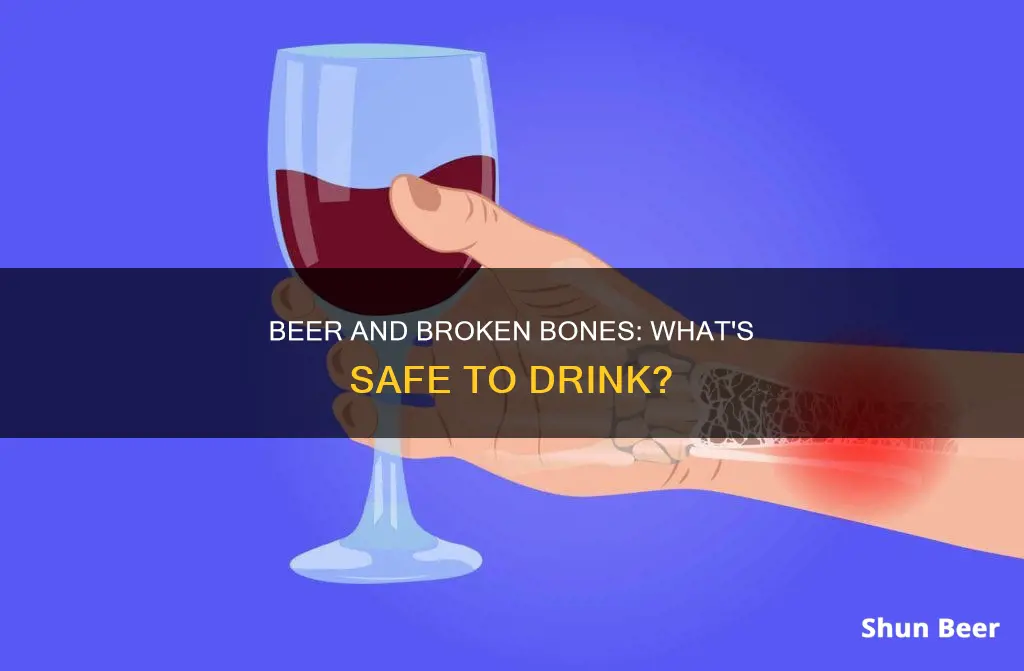
Drinking beer or other alcoholic beverages while recovering from a broken bone is not recommended. Alcohol abuse can negatively impact bone health and healing in several ways. Firstly, alcohol can disrupt hormone production and regulation, affecting the growth hormone, testosterone, and estrogen, which are all crucial for bone growth. Secondly, alcohol can impair vitamin absorption, including calcium and vitamin D, which are essential for bone health. Thirdly, alcohol consumption can directly cause bone weakening and increase the risk of osteoporosis. Additionally, alcohol can increase the risk of falling and fracturing bones. While moderate alcohol consumption is generally considered to be one to two drinks per day for women and two drinks per day for men, exceeding this amount can be considered heavy drinking, which may hinder bone healing.
| Characteristics | Values |
|---|---|
| Effect on bone healing | Heavy alcohol consumption is associated with reduced ability to heal bones. Alcohol affects the body's ability to produce new bone cells called osteoblasts. |
| Effect on bone development | Alcohol can prevent bones from being formed when a person is young. |
| Effect on bone health | Alcohol can cause direct harm to bones, including weakening and breakage. |
| Effect on hormones | Alcohol increases the production of cortisol, which can harm bones. It also harms the production of testosterone and estrogen, which help bone growth. |
| Effect on vitamin absorption | Alcohol impairs the absorption of vitamins and minerals that bones need to stay healthy, such as calcium and vitamin D. |
| Effect on osteoporosis risk | Alcohol increases the risk of osteoporosis, a disease that makes bones less dense and more fragile. |
| Effect on balance and risk of injury | Alcohol can make a person more likely to trip and/or fall, which could cause a broken bone or reinjure a broken bone. |
What You'll Learn

Beer and bone healing
Drinking beer in moderation can have some health benefits, but does that extend to helping heal broken bones? Well, it's not quite that simple. While beer does contain nutrients that are beneficial to bone health, heavy drinking is associated with a reduced ability to heal bones.
The Benefits of Beer
Beer can be a source of silicon, a mineral needed to build new bone mass and connective tissue. The silicon in beer is in the form of orthosilicic acid, and beers produced from barley tend to have higher levels than those made from hops. Pale beers also tend to have higher amounts of silicon, as they are heated less than darker beers.
Alcohol and Bone Health
On the other hand, alcohol consumption can affect bone health and healing in several ways. Firstly, alcohol can disrupt hormone production and regulation, including cortisol, testosterone, and estrogen, which are all important for bone growth. Alcohol can also impair vitamin absorption, including calcium and vitamin D, which are essential for bone health.
Additionally, alcohol can cause direct harm to bones, increasing the risk of breakage and slowing down the healing process. This is partly due to the effects of alcohol on the body's ability to produce new bone cells, known as osteoblasts, which are necessary for repairing broken bones. Alcohol also interferes with the production of the ossifiable matrix, a group of bone cells that harden after a fracture.
Recommendations
If you have a broken bone, it is advisable to speak to your doctor about your alcohol consumption. They may recommend reducing your intake or providing other resources if you are struggling to cut down. It is worth noting that alcohol can also impair judgment and coordination, increasing the risk of falling and re-injuring the broken bone.
The Magic of Beer Fob: How It Works
You may want to see also

Alcohol and ossification
Alcohol consumption can have a range of effects on bone health and healing. Heavy alcohol consumption can affect bone development, health and healing. Alcohol can disrupt hormone production and regulation, vitamin absorption, and cause direct harm to bones, including weakening and breakage.
Alcohol has been shown to affect the cells in bone which make new bones grow. It can also cause falls, which can break bones. Studies have shown that alcohol can harm the bones directly. It does this by harming the cells in bone which make new bones grow.
Heavy drinking can prevent bones from being formed when someone is young. People start to lose bone mass as they get older, which happens even if they do not struggle with heavy alcohol use. However, heavy alcohol use can speed up and worsen the process of bone deterioration.
Heavy alcohol use is known to put you at high risk of developing osteoporosis. When bones become less dense, you may develop osteoporosis. This disease has no symptoms, but your bones become more fragile.
Light to moderate alcohol consumption is generally reported to be beneficial, resulting in higher bone mineral density and reduced age-related bone loss. However, heavy alcohol consumption is generally associated with decreased bone mineral density, impaired bone quality and increased fracture risk.
A Beer Lover's Guide to Mohegan Sun Fest
You may want to see also

Alcohol's effect on balance
Alcohol has a detrimental effect on balance. As alcohol travels through the body, it passes into the blood through the walls of the stomach and small intestine, eventually making its way to the brain. Once alcohol reaches the cerebellum, an area of the brain located near the top of the brain stem, it affects movement and balance. The more alcohol consumed, the more the ossifiable matrix is affected, impairing the body's ability to produce new bone cells. This results in poor coordination and balance, causing people to lose their balance and fall down. These are classic signs of intoxication and can lead to injuries such as bone fractures.
Alcohol also impairs judgment and reaction time, further increasing the risk of accidents and falls. Additionally, chronic and heavy alcohol consumption can cause cerebellar dysfunction, leading to cerebellar ataxia, which is characterised by impaired postural stability and balance. The cerebellum is the motor coordination centre of the central nervous system, and damage to this area can have significant consequences for balance and movement.
The effects of alcohol on balance are further exacerbated when combined with other drugs or medications. Alcohol can increase the side effects of other substances, reduce their effectiveness, or mask their effects, leading to impaired coordination and balance.
Age, physical health, mental health, and the use of other substances can also influence how alcohol affects balance. For example, older individuals may have a lower tolerance for alcohol, and individuals with mental health issues or substance abuse disorders may be more susceptible to the detrimental effects of alcohol on balance.
Overall, alcohol has a significant impact on balance, and consuming too much can lead to accidental injuries and falls. It is important to drink in moderation and be aware of how alcohol affects the body to minimise the risk of harm.
Beer and Sertraline: What You Need to Know
You may want to see also

Alcohol and osteoporosis
Alcohol use affects bone health and healing in a variety of ways. Chronic heavy drinking, particularly during adolescence and young adulthood, can dramatically compromise bone quality and increase the risk of osteoporosis.
Mechanisms
Alcohol appears to affect the body's ability to produce new bone cells called osteoblasts. It also interferes with the production of ossifiable matrix, a basic group of bone cells that harden following a bone fracture. Alcohol affects the bone matrix production by interfering with signals from your injured bone to the brain to signal the need to build new bone cells. The more alcohol consumed, the more affected the ossifiable matrix can be.
Alcohol use can also cause direct harm to bones, including weakening and breakage. It can affect hormone production and impair vitamin absorption. It can increase cortisol production, which can cause bones to break down and slow their healing. It can also harm the production of testosterone and estrogen, which help bone growth.
Reversibility
Research indicates that the effects of heavy alcohol use on bone cannot be reversed, even if alcohol consumption is terminated. However, some studies have found that lost bone can be partially restored when alcohol abuse ends.
A Beer Kegerator's Working: Understanding the Basics
You may want to see also

Alcohol's impact on bone development
Alcohol use affects bone health and healing in several ways. Heavy alcohol consumption can prevent bones from forming properly in young people, and can speed up and worsen the process of bone deterioration in older people. Alcohol can also cause direct harm to bones, such as breakage from falls due to impaired judgement.
Alcohol can affect bone development by disrupting hormone production and regulation, and vitamin absorption. For example, excessive alcohol intake can increase cortisol production, which can cause bones to break down and stop them from healing quickly. Alcohol can also harm the production of testosterone in men and estrogen in women, both of which are important for bone growth.
In addition, alcohol can affect the body's ability to produce new bone cells called osteoblasts, which are necessary for healing after a broken bone. Alcohol also interferes with the production of the ossifiable matrix, a basic group of bone cells that harden following a fracture. Alcohol does this by disrupting signals from the injured bone to the brain to signal the need to build new bone cells.
Furthermore, alcohol consumption has been found to increase the risk of infection at the surgical site following a bone fracture. This can further delay the healing process.
Overall, heavy alcohol use can have detrimental effects on bone development and healing, and it is recommended to limit alcohol intake or seek help to stop alcohol use in order to improve bone health.
Expired Beer: Is It Safe to Drink After Three Years?
You may want to see also
Frequently asked questions
While beer contains silicon, a mineral needed to build new bone mass, excessive alcohol consumption can negatively impact bone health and healing. Alcohol can affect the body's ability to produce new bone cells, disrupt hormone production and regulation, and impair vitamin absorption. Therefore, it is recommended to limit alcohol intake to moderate levels to support the healing process.
Alcohol can slow down bone healing by interfering with the production of new bone cells and disrupting the body's ability to signal the need for new bone cell growth. Additionally, alcohol can increase the risk of falling and sustaining further injuries.
Instead of beer, it is recommended to focus on a healthy and well-balanced diet rich in key nutrients that support bone health and healing. This includes consuming foods with calcium, vitamin D, vitamin C, and iron.







